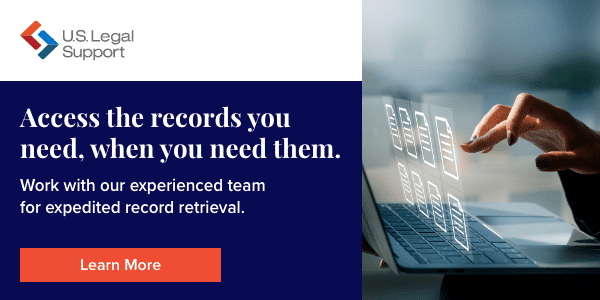Challenges in Medical Record Management & Retrieval

Medical record retrieval is critical to a wide variety of legal disputes. These include cases directly about healthcare-related concerns alongside others that could depend on facts proven through the types of medical records themselves or by triangulating them with other information. In order for these records to be usable in a trial, they must be collected appropriately—which can be difficult.
Below, we’ll provide a brief overview of the medical record retrieval process before diving into three of the biggest challenges lawyers face, their consequences, and how to overcome them.
Overview of Legal Medical Records Management Processes
Medical record retrieval ensures that any and all valuable information in medical records relevant to a case can be leveraged to advance a client’s claim. This includes treatments, billing, and other elements of care that can be essential to a client’s motives, finances, alibi, and more.
To use medical records in court proceedings, they need to be collected, analyzed, prepared, and presented in a way that upholds privacy and ethical concerns for all parties it relates to.
To that effect, best practices for medical record retrieval prescribe a process that includes:
- Medical record identification and purpose designation
- Location and assurance of access to critical records
- Request or subpoena to ensure secure legal access
- Document collection and processing for compliance
- Organization of findings to generate actionable intelligence
- Preparation and presentation in one or more legal contexts
Even for the most careful lawyers and legal teams, however, challenges will arise.
Key Challenges in Medical Records Management
Medical record retrieval is not a simple or straightforward process; there are many hoops that lawyers and legal teams have to jump through, along with negative consequences for failing to comply.
Some of the biggest challenges facing legal teams include:
- Fragmented data resulting from non-standardized data practices
- Compliance with applicable regulations that restrict the flow of sensitive information
- Inherent risks to data security and privacy across electronic health record storage
Let’s take a closer look at each of these challenges and what lawyers can do to overcome them.
Challenge 1: Fragmentation of Records
There are many logistical and other worries related to medical records’ inherent fragmentation, especially relative to other kinds of data. There are several reasons patient medical records are often so fragmented in the U.S., and some have to do with restrictions on data sharing due to regulatory requirements. Another reason records are often partial, seemingly contradictory, and otherwise fragmented is that healthcare itself is extremely fragmented across the country.
Patients often see numerous providers and practices for their healthcare, and those caretakers often share very little with each other. They also share little in terms of what medical data they collect, how they store and process it, and what the actual data says about the same patient. Despite recent efforts by providers to unify their recordkeeping, as well as policy interventions aimed at streamlining care, health services remain fragmented for most patients.1
To address this issue, attorneys and legal teams should communicate extensively with any and all healthcare organizations from which a patient has received medical attention. Identifying inconsistencies and gaps early can help minimize the scrutiny and complaints that could be raised later.

Challenge 2: Compliance with Regulations
The main applicable regulation for medical record retrieval is the Health Insurance Portability and Accountability Act of 1996 (HIPAA). Overseen by the U.S. Department of Health and Human Services (HHS), HIPAA exists to secure protected health information (PHI). However, the restrictions it places on data transfer can create challenges for electronic medical record retrieval.
Namely, the HIPAA Privacy Rule disallows all uses and disclosures of PHI except for specific circumstances.2 Notable examples include uses necessary for healthcare operations, disclosures to law enforcement, and public benefit purposes, such as dissemination of critical information related to disease prevention. Outside of these bounds, sensitive patient information is difficult to obtain.
HIPAA compliance for law firms working with medical organizations presents another complicating factor. Although HIPAA applies most directly to covered entities within the healthcare industry, select business associates also have to abide by HIPAA rules and help covered entities comply.3
Navigating these challenges requires working closely with the covered entities in question and taking every precaution to protect PHI collected. Individually identifiable health information needs to be removed and/or undergo data encryption to minimize the likelihood that a patient could be identified if there is a data breach.
Challenge 3: Data Security and Privacy
Concerns regarding medical records’ fragmentation and regulation are compounded further by the inherent data security and privacy threats to them. Their value to patients and providers makes patient health information a prime target for cybercrime, like phishing and ransomware attacks.
A recent literature review on security concerns for medical records found consensus around4:
- Increasing attacker prowess – Cybercriminal operators are becoming increasingly sophisticated and persistent in their methods, often outpacing advances in defenses.
- “Off the shelf” vulnerabilities – Healthcare providers are turning to low-cost and/or untested systems for patient data storage, which leaves them open to cyberattacks.
- Unintended consequences – Seemingly benign decisions in software design related to integration and information routing compromise data security and patient outcomes.
- Information sharing concerns – Unintentional breaches of confidentiality occur when individual providers share sensitive health information via unapproved channels, such as personal text messages.
The researchers also compiled medical professionals’ and others’ recommendations for mitigating these risk factors. These included implementing and strengthening administrative, physical, and technical safeguards, such as those prescribed in the HIPAA Security Rule.
For legal professionals working with these same records, the best way to navigate this challenge is to uphold the same level of security medical professionals must—or even surpass it.
Consequences of Medical Records Breaches
If sensitive data is leaked as a result of a legal team’s medical record retrieval process, it could have terrible consequences for patients, providers, attorneys, and any other parties involved.
Some of the most critical consequences relate back to the regulatory burden of HIPAA.
Failure to prevent a breach can qualify as noncompliance, which carries fines of up to $50,000 per violation, up to a maximum of over $2M per year.5 In addition, there are responsibilities to uphold if a breach occurs. Per the Breach Notification Rule, covered entities and/or their business associates need to provide notice to any individuals impacted and to the HHS, and a breach that impacts 500 or more people also needs to be reported to local media outlets.6
Another element to consider here is that HIPAA employs a rather broad definition of data breaches. Any instance in which Privacy Rule restrictions are broken could constitute a data breach.
HIPAA enforcement alone is so severe that fear of enacting a breach is actually one of the main contributing factors to the challenge of fragmentation detailed above. Because sharing patient data in any way can expose a covered entity or their business associate to a breach, all parties keep data sharing to an absolute minimum. This protects patient privacy at the expense of friction.
How to Overcome Medical Record Management Challenges
The challenges facing medical records management revolve around the sensitivity, security, and regulatory concerns inherent to medical records. As such, there’s no way to completely avoid them. Instead, intrepid legal teams need to face these challenges head-on with conviction.
Some of the best ways to prevent, mitigate, and manage the challenges above include:
- Proactively communicating with healthcare providers about expected uses of data
- Collecting and retaining the minimum data needed for your specific legal purposes
- Practicing the utmost caution when collecting, sorting, and storing medical records
- Understanding and abiding by all the HIPAA Privacy and Security Rule restrictions
- Installing cyberdefense safeguards across systems that come in contact with PHI
- Setting up communication channels for required reporting if a breach occurs
Working with a trusted legal service provider is another best practice. U.S. Legal Support’s medical record retrieval services help legal teams avoid all challenges of record retrieval.
How Technology is Addressing Medical Records Challenges
Advancements in technology empower lawyers, legal teams, and third-party service providers with new and optimized ways to collect and process records. To begin with, artificial intelligence (AI) and machine learning (ML) tools allow for automated sorting, and analysis, including checking for common indicators of a security or compliance threat. Tech tools can identify whether a document has personally identifiable information (PII) on it, whether and how at-risk a given piece of personal information or entire data set is, or how to utilize a given record.
In addition, tech allows legal service providers to make medical records and their insights much easier and swifter to access for attorneys and others with user-friendly client portals.
These kinds of features make outsourced medical record retrieval an excellent option, even for lawyers and legal teams well-versed in the complications of medical record management. By working closely with a trusted partner, you’ll minimize risks while maximizing efficiency.
Retrieve Medical Records Effectively with U.S. Legal Support
Medical record retrieval is plagued by challenges of fragmentation, regulatory burdens, and data security. Navigating these difficulties requires a careful approach that’s easiest to achieve when working with a quality service provider who makes smart use of cutting-edge technology.
Founded in 1996, U.S. Legal Support is a dedicated partner to legal teams and attorneys in all fields of practice. We’ll help you retrieve medical records securely, efficiently, and effectively.
To learn more about our medical and other record retrieval services, get in touch today.
Sources:
- Mathematica. New Studies Reveal that Fragmented Care Persists Despite Efforts to Improve Primary Care and Care Delivery. https://www.mathematica.org/news/new-studies-reveal-that-fragmented-care-persists-despite-efforts-to-improve-primary-care-and-care
- U.S. Department of Health and Human Services. Summary of the HIPAA Privacy Rule. https://www.hhs.gov/hipaa/for-professionals/privacy/laws-regulations/index.html
- The HIPAA Journal. What Are Covered Entities Under HIPAA? https://www.hipaajournal.com/covered-entities-under-hipaa/
- Cureus. Health Records Database and Inherent Security Concerns: A Review of the Literature. https://www.cureus.com/articles/117118-health-records-database-and-inherent-security-concerns-a-review-of-the-literature#!/
- The HIPAA Journal. What are the Penalties for HIPAA Violations? https://www.hipaajournal.com/what-are-the-penalties-for-hipaa-violations-7096/
- U.S. Department of Health and Human Services. Breach Notification Rule. https://www.hhs.gov/hipaa/for-professionals/breach-notification/index.html

Editoral Policy
Content published on the U.S. Legal Support blog is reviewed by professionals in the legal and litigation support services field to help ensure accurate information. The information provided in this blog is for informational purposes only and should not be construed as legal advice for attorneys or clients.

